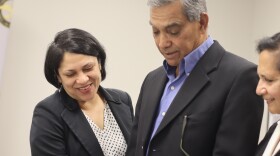After a college career as a Division 1 lacrosse player at the University of Louisville and five knee surgeries, Mónica Negrón didn’t think she’d pick up the stick again.
Despite years of accolades and major wins, Negrón felt out of place for a long time. She was the only Latina on most of her lacrosse teams.
In 2018, at her father's urging, she sent an email to the senior national Puerto Rican women's lacrosse team, and began playing for the team the following year. That rekindled her love for the sport, and with it, a sense of belonging.
“I think being able to be myself, be comfortable in my skin, get to be authentically me, living your true identity and living your true self is such a hard thing, I think for young people in general, especially young women. And I think Puerto lacrosse really helped me with that,” she said.
Now, Negrón is the head coach of the national team.
She heads University of Louisville’s Cultural Center’s Latinx, and Indigenous Initiatives. She’s also the director and owner of the Cardinal Elite lacrosse Academy, which has youth programs for players 5 to 22 years old. And she’s the head coach for varsity women’s lacrosse at Mercy Academy.

According to the NCAA's 2020 survey of U.S. women’s lacrosse players, 83% are white, 3.26% are Hispanic or Latino and 3.86% are Black.
But the field is becoming more diverse, according to an analysis of the NCAA data by ESPN affiliate Inside Lacrosse, which tracks the growth of the sport in the U.S.
The sport may soon have a brighter future on the international stage, too. Last year, the International Olympic Committee said lacrosse will return to the Games in 2028. It was last played in the London Olympics in 1908.
Lacrosse was invented by Native Americans. Negrón said it’s “ironic” that the sport today is predominantly white.
“The sport is supposed to be the creator's game. It's supposed to be accessible. It's supposed to be a medicine game, right? It's supposed to make you feel good, and it's supposed to help you break down barriers,” she said.

The sport is also growing in Latin American countries. Negrón said the Puerto Rican national team, like others, is dependent on donations and sponsorships.
That’s because of how cost-prohibitive it can be, and the lack of access and training opportunities can be a hindrance for many players from marginalized communities, Negrón noted. Players spend over $1,000 on fees, accommodations and other expenses for showcases, where they compete in front of major college lacrosse coaches recruiting for their teams, she said.
Through her work with the national team, Negrón is trying to support a new generation of players in Puerto Rico, who don’t have much exposure or access to the sport.
“Right now, we're in a couple of different schools, but everything costs money, right? And so us being able to get those funds, I think can be able to help us continue to grow especially underrepresented communities,” she said.
At a recent practice session at the University of Louisville’s lacrosse field, Negrón watched players from a distance and shouted advice over the blaring sounds of planes and trains from the nearby railroad tracks.

In August, Negrón helped coach the Puerto Rican national team at the under-20 World Lacrosse championships in Hong Kong, snagging a record 5th place at the championships.
“I think I cried after that game when we beat England for 5th place. And to see, to know that little girls will see a bunch of Black and Brown girls finish top five in the world in lacrosse. Like, for me, just thinking about that is just so amazing,” she said.
Correction: A previous version of this story incorrectly described how Negrón joined the Puerto Rican national team.





